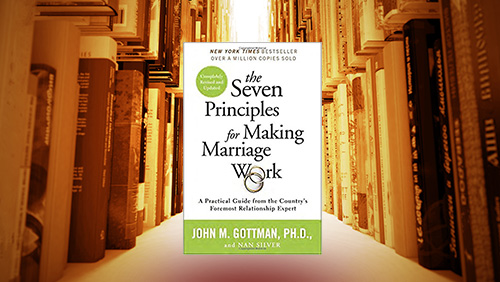Pokerography: The Four Horseman of the Apocalypse
In this week’s Pokerography series, Lee Davy takes a look at John Gottman’s classic: The Seven Principles of Making a Marriage Work relating it to improving your poker game.
I didn’t knock the English teacher out. If I did, it would have been the only punch I landed in the fight. But there she was, lying unconscious on the floor with a Mars bar on her cheek, and I didn’t throw that either.
That was the aftermath of my fight with Byron Dillon. It was a mess. He was a big lad; I wasn’t. I didn’t want to fight, but he kept pestering me, and I had this vision that I could take him.
pestering me, and I had this vision that I could take him.
The biggest problem was anger. I didn’t have any. I often look back to that day and wonder if things could have been different had I been angry? How would my life have looked? He was the hardest kid in the school, and so, if he were lying on the floor with a Mars bar resting on his cheek, I would have replaced him on the throne.
In hindsight, there are two ways I could have generated the anger needed to beat the giant. I could have faced him after arguing with my wife, but that would have been difficult as we were both 16. Or, I could have squared up to him after being hit with a one-outer on the river.
People think anger is a negative emotion. And it is when you use it to send English teachers to dreamland. But it can also be a fantastic feeling if you can learn to control it.
Take relationships for example.
If you are always trading verbals with your wife, then your relationship is heading the way of the Titanic. But if you are in a relationship that has no conflict then it won’t be long before you are swiping left and right on the latest mobile app.
It’s the same in poker.
Anger turns into aggression, and that’s a good thing. But if you are angry all of the time, then you will become too aggressive, and this makes you easy to read. If you suck all the anger out of your game, you become too passive, and the same results stick to you like a soiled nappy on a baby who has just learned to walk.
 So how can we learn to control conflict?
So how can we learn to control conflict?
Awareness – and I found a plastic chip bag full of it, not in a poker book, but in one of the best relationship books in the business: The Seven Principles of Making a Marriage Work by John Gottman, and it’s an awareness of principles known as The Four Horsemen.
Gottman can predict with an insane accuracy whether your relationship will end in divorce after watching you communicate in his lab for no more than 15-minutes.
I think he would make an excellent poker coach.
The Four Horsemen of the Apocalypse
After interviewing thousands of different couples, Gottman found that one of the surest ways for them to split up was when the communication lines fell into the realm of one of four habits he called The Four Horsemen of the Apocalypse.
Let’s look how these can end up divorcing us, not from our partner, but from our stack of chips.
Criticism
When you play poker, you will always feel the need to complain about something. It’s a sport that generates a high level of emotion. But there is a significant different between complaining and criticising.
Imagine someone outdraws you on the river. If, in a momentary loss of emotional control, you react negatively to the outdraw, then that’s expected. Even the very best players in the game find it difficult not to show emotion in these spots.
But a criticism occurs when you take the loss of control to a whole new level and start berating the person who beat you. If you say something like Why did you call? You are such a fish. I have never seen such a bad player. Now, you are moving into the realm of character assassination.
Gottman says, to turn any complaint situation into a criticism, just add the line:
What is wrong with you?
And it doesn’t have to be just the spoken word. Your body language works equally as well.
Criticism is the first port of call for The Four Horseman, and once you start using this weapon it quickly devolves into the other three. If you find yourself criticising someone, internally or externally, it’s time to shift focus. Not only are you doing the game a disservice on a global level, but your personal game is about to go into a tailspin.
Contempt
Once you allow yourself room to criticise your opponent it doesn’t take long for you to steamroll into full-blown contempt. A quicker way for this to escalate is for your opponent to react to your criticism. At that moment, you will be devoid of empathy, and you will counter-react with sarcasm and cynicism.
 Contempt conveys disgust in your opponent. When you are behaving in this way, you become toxic. Your high levels of venom affect the entire table. There is no way of reconciling with your opponent when you have slipped into contempt. Instead, things rapidly escalate.
Contempt conveys disgust in your opponent. When you are behaving in this way, you become toxic. Your high levels of venom affect the entire table. There is no way of reconciling with your opponent when you have slipped into contempt. Instead, things rapidly escalate.
At this moment, your goal is not to address the issue, but to create an even more intense conflict state based on ridicule, name calling, and mockery.
How do you play poker when riding the back of this horse?
Are you in control?
Are you thinking clearly?
And what about the game in general?
How does your dynamic effect the other players and their future in the game?
Defensiveness
Another one of The Four Horsemen is defensiveness.
Imagine the person hammered with criticism and contempt starts to defend their actions, which is very likely, and very human. In doing so, they are in effect blaming the other person for the situation.
Defensiveness is an automatic response, but it doesn’t help. Learning to prevent this mode of being can reap great rewards in a poker game. If in the heat of the moment, you can avoid being defensive, and instead find a grain of truth in what your opponent is saying, then you can put the fire out before it spreads.
And it’s not easy to do this when under attack, and you feel humiliated and want retribution, but think about the game. If your metric of success is to play each hand optimally, can you do this when you are in a peaceful state of equanimity, or when you are riled up and angry?
Next time someone calls you the worst player they have ever seen for outdrawing them, maybe you can find a way to say:
I’m sorry, you are right, I don’t play regularly. I got lucky there, and I know that feeling sucks.
And don’t just use words, connect with your body language. Very often, it removes the venom from your opponent’s forked tongue, because you haven’t given them any reason to fight with, and you can move on in the game in a calmer state.
Stonewalling
The final Horseman arrives after criticism, contempt, and defensiveness has caused so much damage and heartache, that one or the other person involved in the conflict gives up.
There is a huge difference between finding a grain of truth in what your opponent says, and then using that truth to find empathy than simply running away. In a marriage, not only are you turning your back on the issue, but you are giving up on your relationship.
The way this manifests itself in poker is devastating to your bottom line and the future of the game. If you continue to criticise your opponent, hold them in public contempt, and get them to become defensive, or you become defensive when other players try to defend the criticised party, then they will stonewall.
What does that mean?
They will leave the game.
If they are a weaker player, then you have just lost money, not only in this game but in future games where you may have traded blows and wage packets.
And we already see this in the game, today.
It’s one of the cancers of live tournament poker.
And now it has a name: The Four Horseman of the Apocalypse.





